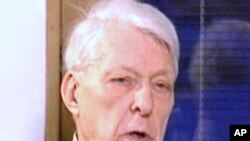The World Health Organization says heart disease kills about 17 million people every year and that it will become the leading cause of death in developing countries. But now, there is some hope. A new device is being marketed that could save countless lives.
Seventy-eight-year-old Richard Stowe has a mechanical pump inside his chest that keeps blood flowing throughout his body. The only evidence is a battery pack and a power line on his side. "The two batteries are feeding power to the controller and then to my chest," he said. "There is no feeling. It just feels very normal like I had no pump."
Stowe is at the forefront of a revolution in the way heart patients are being cared for.
Dr. Leslie Miller at Washington Hospital Center is involved in clinical trials of heart pumps, including this one that the U.S. Food and Drug Administration has approved as a device that can permanently replace the heart for patients who are too old to be considered for a heart transplant.
"Heart failure really begins to increase over the age of 60 when the chances of heart transplantation diminish, so this is going to be a major therapeutic option for a great many patients in the future," Dr. Miller said.
Heart pumps were initially considered a stopgap measure...until a donor heart became available. But the newest pumps are small. They are attached directly to the heart and connected to a battery outside the body.
"These cables would hook up, and this would power it. And this would sit on your belt. So it would sit like this and there would be batteries that you could either put in a fanny pack or there are all kinds of jackets you could wear in order to support the batteries," Dr. Miller explained.
In cases of severe heart disease only eight percent of patients can survive two years. But in a study involving the HeartMate II pump, 58 percent of patients survived that long.
Stowe recalls how little he could do before getting a heart pump. "Very debilitating, 25 to 30 feet at maximum would be the distance I could walk without needing a rest," he said.
"Changing people from a very limited functional capacity is one of the greatest parts of this technology," Dr. Miller said.
Heart pumps are not just for the elderly. They are being used by teenagers and even babies whose hearts have been damaged by viruses. Researchers are now looking at these mechanical pumps as a way to let the heart rest and recover.
As for cost, Dr. Miller says patients with a heart pump spend less time in a hospital and have lower hospital costs than patients with severe heart disease.
Heart Pump Could Save Possibly Millions of Lives








